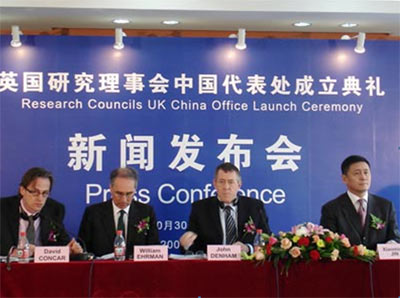Scientific and academic cooperation between the UK and China entered a new era today following the official opening in Beijing of the Research Councils UK (RCUK) Office in China, according to Mr. John Denham, the UK Secretary of State for Innovation, Universities, and Skills at a press conference on October 30.
At the UK-China symposium to mark the opening, he thanked Vice Minister Li Xueyong of the Ministry of Science and Technology for the Chinese government's commitment and efforts to make the new RCUK cooperation bureau a reality.
"As their first bureau outside Europe, the new RCUK office signals the UK's growing regard for Chinese science and commitment to cooperation," he told China.org.cn.
The UK's seven Research Councils have a track record of funding world class research, including the discovery of the ozone hole in the southern hemisphere, development of cloning technology including Dolly, the world's most famous sheep, and the development of monoclonal antibody drugs that now make up one-third of all new drug treatments for several major diseases.
Additionally, many of the UK's 70-plus science Nobel Prize winning projects have been supported by the RCUK. China and the UK have already collaborated on significant science and technology projects. More than 5,500 jointly authored papers were published between 2001 and 2005, according to statistics from the RCUK.
Addressing an audience of nearly 300 researchers, senior university figures and officials from both countries, Mr. Denham said: "It has the potential to help many more scientists and researchers think big ideas and deliver answers to some of the world's biggest problems, such as curing diseases, powering homes and industry more efficiently, and saving the planet for future generations."
He said that the office will work in partnership with China's national research agencies to achieve a clearer understanding of the opportunities and challenges of international research collaboration. It will also work in partnership with the Foreign and Commonwealth Office's Science and Innovation Network in China to build on the achievements of the UK-China Partners in Science initiative, and to improve levels of cooperation between UK organizations and China's provincial and regional science and research organizations.
Mentioning the successful launch of China's 1st moon orbiter, he expressed his hope that the two sides could enhance cooperation in the field, particularly in robotic equipment and remote control technology.
Jin Xiaoming, Director of the International Cooperation Department under the Ministry of Science and Technology, said: "The UK Research Councils have a long and brilliant record in supporting scientific research and the training of talent. I would like to express strong support for the RCUK China Office in its efforts to promote UK-China collaboration."
The most recent interactions between UK and Chinese scientists are at the individual level. "We need to ensure that when individual researchers try to seek funds for joint projects, there are no obstacles and we must provide better service. If we can bring the two countries' research support systems into better alignment, the prospects are good for us," he said.
UK Nobel laureates sent messages of congratulation. "This is an auspicious occasion for the UK, for China, and for humanity," said Sir John Sulston, genome scientist and winner of the 2002 Nobel Prize in Physiology or Medicine. "Close research links between our countries will advance knowledge and accelerate solutions to the pressing problems."
Sir Tim Hunt, cancer researcher and winner of the 2001 Nobel Prize in Physiology or Medicine, said: "I know what a wealth of scientific talent there is in China. I hope that you will be able to promote exchanges and meetings that lead to the better understanding of the natural world."
Professor Ian Diamond, chair of the RCUK Executive Group, said: "China's growing importance in the world is clear; but overcoming geographical, cultural and funding-system barriers needs sustained dialogue and cooperation on many fronts. The UK already jointly authors more science papers with China than any of our EU neighbors but a permanent Beijing base for such work will make a huge impact."
(China.org.cn by staff reporter Wang Ke, October 30, 2007)


